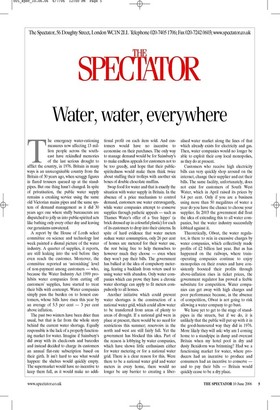Water, water, everywhere
The emergency water-rationing measures now affecting 13 million people across the southeast have rekindled memories of the last serious drought to afflict the country, in 1976. Britain in many ways is an unrecognisable country from the Britain of 30 years ago, when scraggy figures in flared trousers queued up at the standpipes. But one thing hasn’t changed. In spite of privatisation, the public water supply remains a creaking service using the same old Victorian mains pipes and the same system of demand management as it did 30 years ago: one where stuffy bureaucrats are dispatched to jolly us into public-spirited acts like bathing only every other day and leaving our geraniums unwatered.
A report by the House of Lords select committee on science and technology last week painted a dismal picture of the water industry. A quarter of supplies, it reports, are still leaking into the soil before they even reach the customer. Moreover, the committee reported an ‘astonishing’ level of non-payment among customers — who, because the Water Industry Act 1999 prohibits water companies from cutting off customers’ supplies, have started to treat their bills with contempt. Water companies simply pass the burden on to honest customers, whose bills have risen this year by an average of 5.5 per cent — 3 per cent above inflation.
The past two winters have been drier than usual, but that is far from the whole story behind the current water shortage. Equally responsible is the lack of a properly functioning market for water. Imagine if Sainsbury’s did away with its check-outs and barcodes and instead decided to charge its customers an annual flat-rate subscription based on their girth. It isn’t hard to see what would happen: the shelves would quickly empty. The supermarket would have no incentive to keep them full, as it would make no addi tional profit on each item sold. And customers would have no incentive to economise on their purchases. The only way to manage demand would be for Sainsbury’s to make endless appeals for customers not to be too greedy, and hope that their publicspiritedness would make them think twice about stuffing their trolleys with another six boxes of double chocolate muffins.
Swap food for water and that is exactly the situation with water supply in Britain. In the absence of a price mechanism to control demand, customers use water extravagantly, while water companies attempt to conserve supplies through pathetic appeals — such as Thames Water’s offer of a ‘free hippo’ (a brick dressed up in colourful plastic) for each of its customers to drop into their cisterns. In spite of hard evidence that water meters reduce water consumption, only 26 per cent of homes are metered for their water use, the rest being free to help themselves to however much they choose — even when they won’t pay their bills. The government has balked at the idea of compulsory metering, fearing a backlash from voters used to using water with abandon. Only water companies which can prove they have a chronic water shortage can apply to fit meters compulsorily to all homes.
Another initiative which could prevent water shortages is the construction of a national water grid, which could allow water to be transferred from areas of plenty to areas of drought. If a national grid were in place at present, there would be no need for restrictions this summer; reservoirs in the north and west are still fairly full. Yet the government has blocked this idea. Part of the reason is lobbying by water companies, which have shown little enthusiasm either for water metering or for a national water grid. There is a clear reason for this. Were there to be a national water grid and water meters in every home, there would no longer be any barrier to creating a liber alised water market along the lines of that which already exists for electricity and gas. Then, water companies would no longer be able to exploit their cosy local monopolies, as they do at present.
Customers who receive high electricity bills can very quickly shop around on the internet, change their supplier and cut their bills. The same facility, unfortunately, does not exist for customers of South West Water, which in April raised its prices by 9.4 per cent. Only if you are a business using more than 50 megalitres of water a year do you have the chance to choose your supplier. In 2003 the government did float the idea of extending this to all water companies, but the water industry successfully lobbied against it.
Theoretically, Ofwat, the water regulator, is there to rein in excessive charges by water companies, which collectively made profits of £2 billion last year. But as has happened on the railways, where trainoperating companies continue to enjoy monopolies on their routes and have consistently boosted their profits through above-inflation rises in ticket prices, the government regulator has proved a feeble substitute for competition. Water companies can get away with high charges and poor performance because, in the absence of competition, Ofwat is not going to risk allowing a water company to go bust.
We have yet to get to the stage of standpipes in the streets, but if we do, it is unlikely that the public will put up with it in the good-humoured way they did in 1976. More likely they will ask: why am I coming home to a standpipe in damp and overcast Britain when my hotel pool in dry and dusty Benidorm was brimming? Had we a functioning market for water, where producers had an incentive to produce and consumers had an incentive to conserve and to pay their bills — Britain would quickly cease to be a dry place.


















































































 Previous page
Previous page